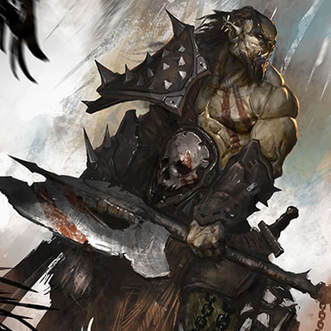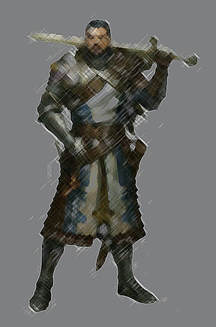Maybe it's because I've always enjoyed math, and I've always been good at quick calculation, but Pathfinder requires more than that. It requires organization, and rewards character planning. There are many numbers in play in Dungeons and Dragons, and there are many more in Pathfinder. If you crave deeper mechanical customization, I highly recommend trying it out, as there are rules and builds for just about anything you can imagine...and they all use numbers to back them up. Numbers aren't scary. They make games function, and there is safety in the mechanics that utilize clear values. Where Pathfinder becomes overwhelming for folks is when they start to consider ALL of their options. With over 1000 Feats to choose from now, and stacks upon stacks of books, home-brew, race builders, alternate class options, and a massively supported multi class system, it can feel like a little much. But I love it. And I love it because it forces me to stay organized. I can cause shenanigans, insanity, and other hilarious hijinks, just like any other tabletop rpg, but I'm also supported by a system of numbers that I am continually trying to maneuver in my favor.  Say what you will about Sword Art Online’s first season (and it’s abysmal second half…shudder), but SAO Abridged by Something Witty Entertainment hits the nail right on the head when it comes to the active elements of Pathfinder. The protagonist, Kirito, is squaring off in one of the earlier episodes against a band of player killers…and he’s just standing there. They surround him and slice into his form, and he just stands there. They end up heaving and wheezing, tired, and he calmly explains that in a game like this, it’s very simple. “My numbers…are BIGGER than yours. My wounds heal FASTER than you can make them.” Now if I achieve THAT with Bigby, my Monday night Pathfinder fighter character, I’m pretty sure I’ve ascended to godhood - and it’s only possible if I somehow become half-troll or am blessed by the evil god of regeneration… I’m getting ahead of myself. The main point here, and the reason that I really enjoy Pathfinder, IS its reliance on numbers and floating, conditional modifiers. At first, it WAS overwhelming, especially when compared, back then for me, to D&D 1st Edition and Advanced D&D, followed up quickly by 4th Edition and one failed attempt at 3rd Edition (not 3.5). But after years of playing Grignor, a half-orc Barbarian in Pathfinder, and more years (8, before taking a break to dive into 5E) teaching the darn thing, you start to see the method to the madness of numbers, bonuses, penalties, and feat chaining. I organized my powers, rage abilities, and other conditions (like when my allies would cast spells on me like Enlarge Person and Bull Strength) into a literal spreadsheet to streamline my own process. Now, that doesn't have to be NECESSARY for play, but for me it was a way to make sense of the madness. "If that, then roll with this. If this, roll with that." Less thinking needed after some pre-organization. AND, after doing this with my characters, I started to become more organized in my own life. Recognition of my own need to be organized in a fantasy world, then executing that organization in a thoughtful way, opened the door to pursue a more professional workspace. If one is thoughtful and plans accordingly, you CAN have a fighter at level 4 (4!) with an AC of 24 - without Platemail or Tower Shield - who can dual-wield with axe and shield, deals great damage, and if anyone shoots him from a distance with an arrow or bolt, he blocks it once per round. My DM, another of my team, bless him, has to roll a Natural 20 on most occasions just to hit me. Put simply: my numbers are bigger than his. And that is mostly through some good rolls at character creation, picking a human combat class that gets feats EVERY level, and focusing on one core concept: Sword and Board. Protect and Attack. If it does not support that concept, I don't even look at it. Having a working knowledge of how my numbers act during play is the most powerful skill gleaned from playing Pathfinder, and one has to approach this idea with the understanding that the numbers working for and against you are literally the mechanics of the game at work. They are built in to provide a sense of realism for tasks and abilities that WOULD be difficult, even for an adventurer. For example, with Bigby, dual-wielding a shield and sword is possible at level 1 with no help, but at that point I’m just a dude who picked up a shield and sword and tried to swing it around. To do so is possible, but hard without training, so I take a penalty: -6 to my attack with my primary hand (sword), and a whopping -10 to the off-hand (shield). Now, coming off of 5E, that’s quite a penalty, but take note that Pathfinder is, by its nature, a machine-builder when it comes to your character. Those are the base penalties; now it’s time to stack the odds in my favor and make those penalties as small as possible or downright inconsequential. So let’s work through it. At Level 1, Bigby has a Strength score of 20 - 18 rolled +2 for being Human, and a Dexterity of 17 - lucky roll and necessary later. I take the low ones in my mental stats; they don’t help me with those penalties anyway and it’s not part of my concept. Strength of 20 grants me a +5 bonus to my attack and damage. Now those penalties are a -1/-5. Alright, then, but what does the class give me? Level 1 gives me a Base Attack Bonus (ONE of Pathfinder’s representations of a proficiency bonus) of +1. Penalties now: +0/-4. (Those increase by +1 every level) Now I’ve got Feats to think about. Every player gets 1 Feat at level 1, humans get a bonus feat, and Fighters get a combat feat at level 1. So I’ve got three feats to figure out. Well, I need bonuses to my attacks, not penalties, so let’s grab these to start: Right off the bat, I grab Two-Weapon Fighting, which evens out and drops the penalties to -4/-4, so with my bonuses now (+6 each)… that's +2/+2. That’s not bad, but I’ve got other problems. You see, IF I bash with my shield, I’m too busy bashing people’s faces in to defend myself, so I lose the bonus to my Armor Class (AC) when I bash. That won’t do, so for my second Feat I’ll grab Improved Shield Bash, which lets me keep my AC bonus when I bash (yay, less floating modifiers = less thinking for me). Finally, I don’t get my awesome Strength modifier to damage with my shield (off-hand), so I take my last feat, Double Slice, to cut that right out. So, now, at Level 1, I keep my AC bonus when I bash, my strength gets added to all of my attacks and damage, and I get to swing two weapons with the same bonus to hit (+2/+2). Now, moving forward, those numbers will just keep rising, and I can keep finding ways to minimize my penalties and augment my bonuses. On top of this, I have Skill Ranks instead of a general proficiency bonus. That means that every level, I can pour points into skills to help the things I stink at, stink a little less; with more bonuses to skills that are part of my class. So far, Bigby's done this: Level 2 - Shield Focus (+1 AC w/Shield), +3/+3 --- Level 3 - Two-Weapon Defense (+1 AC with two weapons), +4/+4 Level 4 - Missile Shield (block one ranged attack per round), +5/+5 --- Later, multiple attacks with shield, more bonuses to hit, higher AC, etc. And so on. My point is, math rules. Math is power. And Pathfinder is one of the systems where math is clearly translated into power through the context of the game. By taking choice Feats early on, both my Fighter character and my old standby Barbarian were very tough combatants at low-level and could grow toward fighting literal gods...because I organized my play. Nothing had to be by the book, and I wasn't forced into any particular build; in fact, quite the opposite, I could be LITERALLY ANYTHING, and there were rules to support it. Which is awesome. But it takes some work. Anyone who has studied game design is aware of this... Any game, tabletop or otherwise, uses numbers to make itself function. Now, I can build a character pretty quickly, but playing alongside others in our community, I understand their apprehension to the system. Taking a step back to look at it is downright nuts. So if you're new to Pathfinder, I highly recommend ONLY using the Core Rulebook's Races and Classes. There's plenty in there to keep you busy, and you won't get overwhelmed. Take it slow, and you'll see the power of math in action...right before you leap toward a dragon screaming that you're going to name it Fluffy. :) See you at the table, -Adamus
0 Comments
|
Adam SummererProfessional Game Master musician, music teacher, game designer, amateur bartender, and aspiring fiction author. Honestly, I write what I want when I want. Often monster lore, sometimes miniature showcases, and the occasional movie/show review.
Archives
April 2024
Categories
All
|

 RSS Feed
RSS Feed